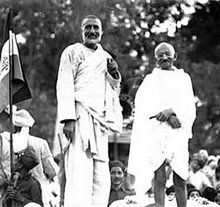
Abdul Ghaffar Khan, 98, a Follower of Gandhi
Published: January 21, 1988
LEAD: Abdul Ghaffar Khan, a Moslem disciple of Mohandas K. Gandhi who opposed British rule in India and partition of the subcontinent, died yesterday in a hospital in Peshawar, Pakistan. He was 98 years old and had suffered a stroke six months ago.
Abdul Ghaffar Khan, a Moslem disciple of Mohandas K. Gandhi who opposed British rule in India and partition of the subcontinent, died yesterday in a hospital in Peshawar, Pakistan. He was 98 years old and had suffered a stroke six months ago.
A tough Pathan tribesman from India's old northwest frontier, Mr. Ghaffar Khan's martial beak of a nose and towering and powerful physique - at six and a half feet, he once weighed 220 pounds - made him look capable in earlier years of wrestling a bullock to the ground.
Yet, often dressed like his mentor in homespun clothes and with his hair and beard clipped short, Mr. Ghaffar Khan spent a lifetime advocating nonviolence to achieve his political aims - and at least 25 years in British and Pakistani jails for doing so.
The causes he fought for from the early 1920's until his last arrest by the Pakistan Government in 1976 were the independence of India, a unified India as homeland for both Hindu and Moslem, and Pathan autonomy in the Pakistan created when India gained independence in 1947. The only goal he attained was the first.
The Indian Prime Minister, Rajiv Gandhi, stopped in Peshawar yesterday on his way to Sweden to pay tribute to the man who was known in India during the long struggle with the British as the ''frontier Gandhi,'' and who last year was honored with India's highest civilian award, the Jewel of India. 'A Freedom Fighter'
Prime Minister Gandhi hailed Mr. Ghaffar Khan as a ''freedom fighter'' who was devoted to ''nonviolence and wonderful humanity.'' The world, Mr. Gandhi said, ''has lost a very good man.''
A measure of the different feelings about Mr. Ghaffar Khan in India and Pakistan was the immediate declaration of a five-day period of mourning for him in India and the lack of a similar declaration in Pakistan.
Mr. Ghaffar Khan, whose father was a Pathan tribal chief, was born in 1889 in the scrubby mountains that spill across the border into Afghanistan. In those days of the British Raj and Kipling's tales of valor at the Khyber Pass, Mr. Ghaffar Khan carried the hereditary warrior landowning title of Khan Abdul Ghaffar Khan and, informally as he gained prominence, the King of Khans.
But all the trappings of rank were to change after he met Mahatma Gandhi in 1919. Over the next decade, Mr. Ghaffar Khan grew increasingly close to Mr. Gandhi until by the late 1930's he, Jawaharlal Nehru and Vallabhai Patel were among Gandhi's inner circle of advisers and leaders in the Congress Party, the dominant political expression of Indian nationalism.
In the late 1920's, Mr. Ghaffar Khan established a nonviolence movement called, interchangeably, the Servants of God and the Red Shirts. Its adherents, initially drawn from the poor northwest frontier peasantry, swore on the Koran to follow the teachings of Islam and, if persecuted, to refrain from violent resistance.
For almost two decades, Mr. Ghaffar Khan and his Red Shirts, so-called because of the bright scarlet color of their marching uniforms, walked thousands of miles around India urging Hindu and Moslem alike to practice civil disobedience and to join the political struggle for freedom.
Mr. Ghaffar Khan's leadership of the Red Shirts led to several arrests by the British without changing his attitude because, as he said once when emerging from a British jail, ''With love you can persuade a Pathan to go to hell, but by force you cannot take him even to heaven.'' In the end, the Red Shirts became an auxiliary of the Congress Party. Sought Separate State
By 1943, with the Moslem League under Mohammed Ali Jinnah gaining ascendancy over Mr. Ghaffar Khan's Congress Party movement as the voice of India's Moslems, Mr. Ghaffar Khan campaigned vigorously against Hindu-Moslem communal violence and the growing prospect of partition. In 1946, a year of bloody communal violence, Mr. Ghaffar Khan was hospitalized in Peshawar after being hit by stones thrown by rioters of his own faith.
Realizing on the eve of India's independence that partition could not be blocked, Mr. Ghaffar Khan unsuccessfully sought the establishment of a separate Northwest Frontier State to avoid the old Pathan province's absorption into Pakistan.
The new state of Pakistan, of which Mr. Jinnah was the Governor-General, promptly jailed Mr. Ghaffar Khan and his politically active older brother, Dr. M.L.A. Sahib Khan, for anti-state activities. They were held for six years, until 1954. Although Dr. Sahib Khan made peace with his jailers and joined Pakistan's first coalition Government as Minister of Communications in October 1954, Mr. Ghaffar Khan took a different political tack that was to put him back in jail on many occasions in the years ahead: the drive for an autonomous Pathanistan. In the 1960's, still at odds with the Pakistan Government, Mr. Ghaffar Khan went into exile in neighboring Afghanistan.



No comments:
Post a Comment